Related Research Articles

"Evil on Your Mind" is a song written by Harlan Howard that was originally recorded by his wife Jan Howard. Released as a single by Decca Records, the song made the US country top ten in 1966 and became one of six top ten singles in Jan Howard's career. The song received positive reception from publications following its release and was later nominated in 1967 by the Grammy Awards. It also served as the title track to her 1966 studio album Jan Howard Sings Evil on Your Mind.

The discography of American country artist Jan Howard contains 17 studio albums, six compilation albums, 51 singles, one box set, two other charted songs and 12 additional album appearances. Her recordings were issued as singles beginning in 1958. The first to chart was issued by Challenge Records called "The One You Slip Around With". Released in 1959, it rose into the US Hot Country Songs top 20. It was followed by two duets with Wynn Stewart, including the chart record "Wrong Company". Howard's debut studio album, Sweet and Sentimental, featured dual credit with The Jordanaires and was issued by Capitol Records in 1962. In 1963, "I Wish I Was a Single Girl Again" reached the top 30 of the US country songs chart.
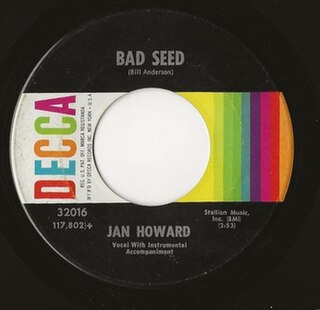
"Bad Seed" is a song written by Bill Anderson that was originally recorded by American country artist Jan Howard. Released as a single by Decca Records, it was the second top ten song on the US country chart in Howard's career. It was given reviews by Billboard, Cash Box and Wide Open Country.

"Count Your Blessings, Woman" is a song written by Bill Anderson that was originally recorded by American country artist Jan Howard. Released as a single in 1968, it placed in the top 20 on the US country chart and the top ten on the Canadian country chart. It was released on an album of the same name and was given reviews from both Billboard and Cash Box magazines.
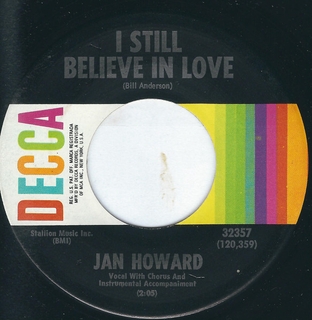
"I Still Believe in Love" is a song written by Bill Anderson that was originally recorded by American country artist Jan Howard. Released as a single by Decca Records, it made the top 40 on the US country chart and the top ten on the Canadian country chart. It was given reviews from both Billboard and Cash Box magazines.

"We Had All the Good Things Going" is a song written by Mervin Shiner and Jerry Monday that was originally recorded by American country artist Jan Howard. Released as a single, it made the top 20 of the US country songs chart in 1969. It later appeared on her 1970 studio album Rock Me Back to Little Rock. The song received reviews from Billboard and Cash Box magazines.

Jan Howard Sings Evil on Your Mind is a studio album by American country artist Jan Howard. It was released in July 1966 by Decca Records and was her second studio album. The project consisted of 12 tracks featuring both uptempo and ballad material. Its title track was a top five US country song in 1966 and was one of four singles on the album. Another was the charting 1964 song "What Makes a Man Wander?". The album itself made the US country survey following its release and received critical reception from Cash Box magazine.

The singles discography of Wanda Jackson, an American recording artist, consists of 81 singles, nine international singles, one other charted song, and three music videos. In 1954 at age 16, she signed as a country artist with Decca Records. Her debut single was a duet recording with Billy Gray which reached the eighth spot on the Billboard Hot Country Singles chart, also in 1954. Refusing to tour until completing high school, Jackson's further singles for Decca failed gaining success. She signed with Capitol Records in 1956 and began incorporating rock and roll into her musical style. Jackson's first Capitol single exemplified this format and became a national top-20 country hit. Follow-up rock singles between 1957 and 1959 failed gaining enough attention to become hits including, "Hot Dog! That Made Him Mad", "Fujiyama Mama", and "Honey Bop". In 1960 however, the rock and roll-themed, "Let's Have a Party", became Jackson's first Billboard top-40 pop hit after it was picked up by an Iowa disc jockey.
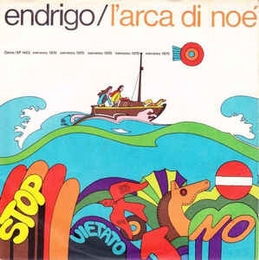
"L'arca di Noè" is a 1970 song composed by Sergio Endrigo. The song premiered at the 20th edition of the Sanremo Music Festival, with a double performance by Endrigo and Iva Zanicchi, and placed at the third place.

Bad Seed is a studio album by American country music artist Jan Howard. It was released in November 1966 via Decca Records and featured 12 tracks. The third studio album of her recording career, Bad Seed was named for its title track, which reached the top ten of the country charts in 1966. The disc was met with a favorable review from Cashbox following its release.
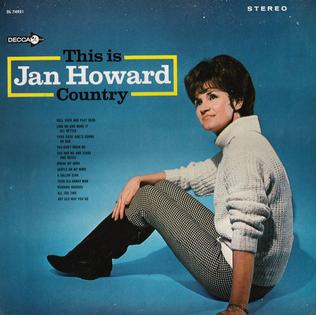
This Is Jan Howard Country is a studio album by American country artist Jan Howard. It was released in November 1967 by Decca Records and contained a total of 12 tracks. The album was the fourth released in Howard's career, featuring both uptempo tunes and ballad songs. Along with cover tracks were also new recordings. This included two single releases that made the US country top 40: "Any Old Way You Do" and "Roll Over and Play Dead". The album itself made the US country albums top ten list. It received positive reviews from both Billboard and Cash Box magazines.

Count Your Blessings, Woman is a studio album by American country music artist Jan Howard. It was released in June 1968 via Decca Records and contained 11 tracks. Many of the album's tracks were cover tunes with the exception of the title track. Released as a single, the title track was a top 20 US country song and a top ten Canadian country song. The album itself made the top 30 of the US country survey. Howard's vocal performance was praised in reviews by Billboard and Cash Box magazines.
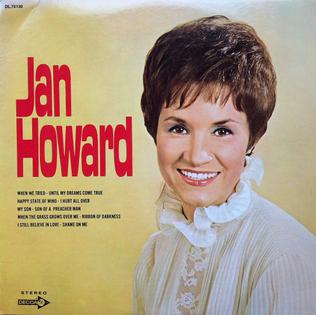
Jan Howard is an eponymous studio album by American country artist Jan Howard. It was released by Decca Records in June 1969 and contained ten tracks. The project contained a series of cover tunes, along with new songs. Among the new recordings were three singles: "I Still Believe in Love", "My Son" and "When We Tried". "My Son" was a letter Howard put to music written to her son who was killed in the Vietnam War. The album was given positive reception by Cash Box and Record World magazines. The album made the US country albums and its three singles reached positions on the North American country songs charts.

Rock Me Back to Little Rock is a studio album by American country artist Jan Howard. It was released by Decca Records in June 1970 and was her tenth studio album. The project contained 11 tracks with a mixture of original tunes and cover songs. Among its tracks were two single releases: "We Had All the Good Things Going" and the title track. Both made appearances on the US country songs chart between 1969 and 1970. The album itself also made the US country chart. Both Billboard and Cash Box magazines reviewed the album following its release.
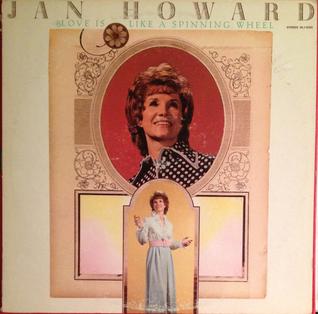
Love Is Like a Spinning Wheel is a studio album by American country artist Jan Howard. It was released by Decca Records in March 1972 and was her twelfth studio album. The project contained 11 tracks, which were a mixture of new songs and cover tunes. Among its tracks were two singles: "Let Him Have It" and the title track. The latter was a top 40 US country song and a top 20 Canadian country song. The album itself made the top 40 of the US country albums chart. The project was given reviews from Billboard and Cash Box magazines.

"Wish I Didn't Have to Miss You" is a song written by Hank Cochran and Dave Kirby. It was originally and released as a duet by American country music artists Jack Greene and Jeannie Seely. Released as a single in October 1969, the song became a number two song on the US country chart in early 1970. The song was given positive reviews from Billboard and Cash Box magazines and would influence the making of their debut studio album in 1970.
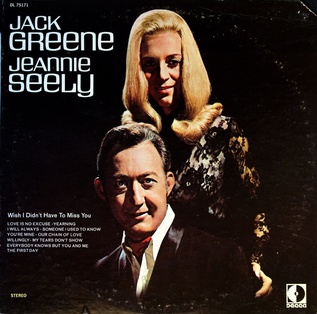
Jack Greene, Jeannie Seely is a studio album by American country music artists Jack Greene and Jeannie Seely. It was released by Decca Records in January 1970 and contained 11 tracks of mostly cover tunes. Although already both having two separate successful country recording careers, Greene and Seely teamed up to record an album of duets following the success of their single "Wish I Didn't Have to Miss You", which is also included. The LP received positive reviews from Billboard, Cash Box and Record World magazines.
"Any Old Way You Do" is a song written by Harlan Howard that was originally recorded by his wife and American country artist Jan Howard. Released as a single by Decca Records, it rose into the US country top 40 in 1967 and was later issued on her studio album This Is Jan Howard Country. It was given positive reviews by music publications following its release.
"When We Tried" is a song written by Jerry Chesnut that was originally recorded by American country artist Jan Howard. Released as a single by Decca Records, it made the top 40 on the US country chart in 1969. It was given a positive review by Cash Box magazines and appeared on her eponymous 1969 studio album.
"Rock Me Back to Little Rock" is a song written by Lola Jean Dillon that was originally recorded by American country artist Jan Howard. Released as a single by Decca Records, it reached the top 40 of the US country songs chart in 1970. It was later included on her studio album of the same name. The song received a positive response from Cash Box magazine following its release.
References
- 1 2 "Spotlight Singles: Country Spotlight". Billboard . June 24, 1967. p. 18. Retrieved 31 August 2024.
- ↑ Oermann, Robert K.; Bufwack, Mary A. (2003). Finding Her Voice: Women in Country Music: 1800–2000 . Nashville, TN: The Country Music Press & Vanderbilt University Press. p. 228. ISBN 0-8265-1432-4.
- 1 2 3 Howard, Jan (June 1967). ""Roll Over and Play Dead"/"You and Me and Tears and Roses" (7" vinyl single)". Decca Records . 32154.
- ↑ Howard, Jan (2005). "Through the Years with Jan Howard (CD Box Set Information)". Self-released. Collector's Edition-0317.
- ↑ "Country Reviews: The Cash Box Bullseye" (PDF). Cash Box . June 24, 1967. p. 58. Retrieved 31 August 2024.
- ↑ Whitburn, Joel (2008). Joel Whitburn Presents Across the Charts, the 1960s. Record Research. p. 184. ISBN 978-0898201758.
- ↑ Howard, Jan (October 1967). " This Is Jan Howard Country (Liner Notes)". Decca Records . DL-4931 (LP Mono); DL-74931 (DL Stereo).
- ↑ "Jan Howard Chart History (Hot Country Songs)". Billboard. Retrieved September 1, 2024.